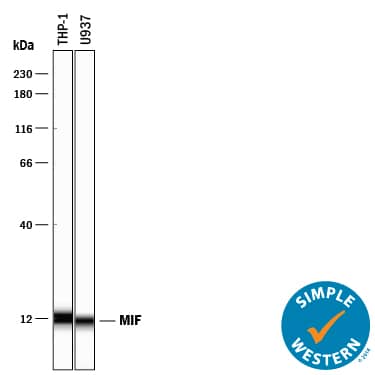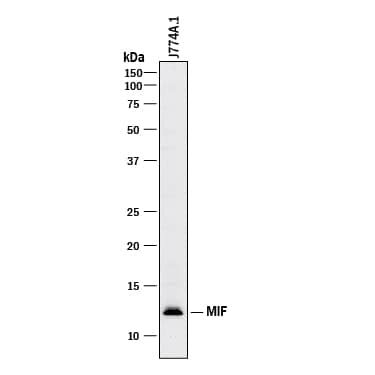Human/Mouse MIF Antibody
R&D Systems, part of Bio-Techne | Catalog # AB-289-PB

Key Product Details
Species Reactivity
Validated:
Cited:
Applications
Validated:
Cited:
Label
Antibody Source
Product Specifications
Immunogen
Specificity
Clonality
Host
Isotype
Scientific Data Images for Human/Mouse MIF Antibody
Detection of Human MIF by Western Blot.
Western blot shows lysates of THP-1 human acute monocytic leukemia cell line and U937 human histiocytic lymphoma cell line. PVDF membrane was probed with 0.2 µg/mL of Goat Anti-Human/Mouse MIF Polyclonal Antibody (Catalog # AB-289-PB) followed by HRP-conjugated Anti-Goat IgG Secondary Antibody (Catalog # HAF017). A specific band was detected for MIF at approximately 12 kDa (as indicated). This experiment was conducted under reducing conditions and using Immunoblot Buffer Group 1.Detection of Human MIF by Simple WesternTM.
Simple Western lane view shows lysates of THP-1 human acute monocytic leukemia cell line and U937 human histiocytic lymphoma cell line, loaded at 0.2 mg/mL. A specific band was detected for MIF at approximately 12 kDa (as indicated) using 25 µg/mL of Goat Anti-Human/Mouse MIF Polyclonal Antibody (Catalog # AB-289-PB) followed by 1:50 dilution of HRP-conjugated Anti-Goat IgG Secondary Antibody (Catalog # HAF109). This experiment was conducted under reducing conditions and using the 12-230 kDa separation system.Detection of Mouse MIF by Western Blot.
Western blot shows lysates of J774A.1 mouse reticulum cell sarcoma macrophage cell line. PVDF membrane was probed with 1 µg/mL of Goat Anti-Human/Mouse MIF Polyclonal Antibody (Catalog # AB-289-PB) followed by HRP-conjugated Anti-Goat IgG Secondary Antibody (Catalog # HAF017). A specific band was detected for MIF at approximately 12 kDa (as indicated). This experiment was conducted under reducing conditions and using Immunoblot Buffer Group 1.Applications for Human/Mouse MIF Antibody
Simple Western
Sample: THP‑1 human acute monocytic leukemia cell line and U937 human histiocytic lymphoma cell line
Western Blot
Sample: THP‑1 human acute monocytic leukemia cell line, U937 human histiocytic lymphoma cell line, and J774A.1 mouse reticulum cell sarcoma macrophage cell line
Formulation, Preparation, and Storage
Purification
Reconstitution
Formulation
Shipping
Stability & Storage
- 12 months from date of receipt, -20 to -70 °C as supplied.
- 1 month, 2 to 8 °C under sterile conditions after reconstitution.
- 6 months, -20 to -70 °C under sterile conditions after reconstitution.
Background: MIF
MIF (or macrophage migration inhibitory factor) was the first lymphokine/cytokine to be recognized in the pregenomics era (1, 2). Regardless, it is one of the least understood of all inflammatory mediators (1, 3). Human MIF is a 12.5 kDa, 115 amino acid (aa) nonglycosylated polypeptide that is synthesized without a signal sequence (4-7). Secretion occurs nonclassically via an ABCA1 transporter (8). The initiating Met is removed, leaving Pro as the first amino acid. The molecule consists of two alpha-helices and six beta-strands, four of which form a beta-sheet. The two remaining beta-strands interact with other MIF molecules, creating a trimer (2, 9, 10). Structure-function studies suggest MIF is bifunctional with segregated topology. The N- and C-termini mediate enzyme activity (in theory). Phenylpyruvate tautomerase activity (enol-to-keto) has been demonstrated and is dependent upon Pro at position #1 (11). Amino acids 50-65 have also been suggested to contain thiol-protein oxidoreductase activity (12). MIF has proinflammatory cytokine activity centered around aa’s 49-65. On fibroblasts, MIF induces, IL-1, IL-8 and MMP expression; on macrophages, MIF stimulates NO production and TNF-alpha release following IFN-gamma activation (13, 14). MIF apparently acts through CD74 and CD44, likely in some form of trimeric interaction (15, 16). Human MIF is active on mouse cells (14). Human MIF is 90%, 94%, 95%, and 90% aa identical to mouse, bovine, porcine and rat MIF, respectively.
References
- Norand, E.F. and M. Leech (2005) Front. Biosci. 10:12.
- Donn, R.P. and D.W. Ray (2004) J. Endocrinol. 182:1.
- Calandra, T. and T. Roger (2003) Nat. Rev. Immunol. 3:791.
- Kozak, C.A. et al. (1995) Genomics 27:405.
- Weiser, W.Y. et al. (1989) Proc. Natl. Acad. Sci. USA 86:7522.
- Paralkar, V. and G. Wistow (1994) Genomics 19:48.
- Wistow, G.J. et al. (1993) Proc. Natl. Acad. Sci. USA 90:1272.
- Flieger, O. et al. (2003) FEBS Lett. 551:78.
- Philo, J.S. et al. (2004) Biophys. Chem. 108:77.
- Sun, H-W. et al. (1996) Protein Eng. 9:631.
- Stamps, S.L. et. al. (2000) Biochemistry 39:9671.
- Nguyen, M.T. et al. (2003) J. Biol. Chem. 278:33654.
- Sato, A. et al. (2003) Dev. Comp. Immunol. 27:401.
- Bernhagen, J. et al. (1994) Biochemistry 33:14144.
- Leng, L. et al. (2003) J. Exp. Med. 197:1467.
- Meyer-Siegler, K.L. and P.L. Vera (2005) J. Urol. 173:615.
Long Name
Alternate Names
Gene Symbol
UniProt
Additional MIF Products
Product Documents for Human/Mouse MIF Antibody
Product Specific Notices for Human/Mouse MIF Antibody
For research use only


